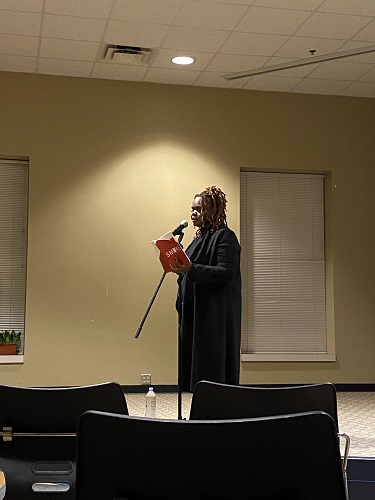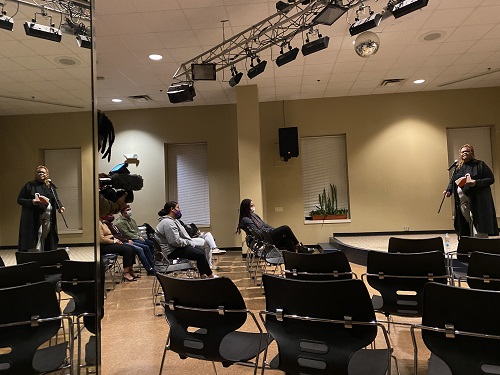
Poetry provides an emotional catharsis, as Ashlee Haze, an accomplished spoken word artist and the author of “Smoke”, showed Thursday.
Last Minute Productions brought Haze to Western on Thursday, Nov. 18 in the University Center.
According to her website’s biography, Haze, whose nickname is “Big 30” after her consistency in getting a perfect score, is one of the most accomplished poets in the art of poetry slam.
She started writing poetry at age 10 and has since gone on to be a three-time Queen of the South poetry Slam Champion, two-time Women of the World Poetry Slam Finalist, and two-time National Poetry Slam semi-finalist.
Haze exhibited her identity through her poetry. To her, poetry is an outlet. Poetry allows one to process emotions and experiences while being honest and vulnerable. Poems allow your inner voice to speak out. Poetry is even a way for Haze to let out her pettiness and say things that she wants to say. When asked what poetry is for her, she responded with “It’s my lifeline.”
The poems she shared talked about her background and identity. The topics in her poems were about inner love and her love life, heartbreak, forgiveness, reclaiming parts of herself, and her dreams.

In one piece about reclaiming femininity, she said:
“‘Why be eye candy when you can be soul food?’ Like I can’t multitask.” This was her way of saying that she can be smart and beautiful at the same time. She also had pieces that spoke about racial identity, including dancing. Some people have a tendency to turn their noses up in scorn of twerking, a form of sexually enticing dancing. Some people look at twerking as dirty and assume anyone who does it is promiscuous. One of Haze’s pieces said that she’s been doing it since she was young at family gatherings before that form of dancing was called “twerking.” She described the dances as cultural, tracing back to different African tribal dances.
Poetry is a form of expression, but expression isn’t always romantic and neither is life. In a poem called “Heaven for a Black Girl,” Haze spoke about her dreams and imagining of Heaven, a Heaven without the pain that communities of color tend to experience. In it, she’s dressed to the nines wearing a pair of Jordans and eating crab at sunset. In her dreams of Heaven, a Black girl can live to tell her friends about a speeding ticket she got. Children eat every night and don’t go hungry. Mothers have money to provide for their children and leave a man if he doesn’t choose love. In her Heaven, the refugees and immigrants are accepted. In her Heaven, the Black girl breathes and the Black man lives to talk trash about his friend’s favorite sports team.
Poetry is a way for individuals to express themselves and speak their minds. Poetry can be beautiful, sad, tragic, hopeful, romantic, happy, epic, or any other adjective that describes human emotion. Poetry can also be a way to dream about the future and help make those dreams into reality. At the very least, poetry can provide us with a beautiful shading to our not-so-beautiful experiences.
About 10 students showed up to Haze’s performance. Lucas Beal, graduate assistant for LMP, said he was overall happy with the attendance as long as the performer is happy with it. Beal does wish that attendance would have been higher due to Haze’s ability to work the crowd, communicate and perform pieces that are relatable to many people.
Beal hopes to bring Haze back in the future. He hopes to host a sort of arts festival next year to showcase the beauty of more forms of art than just a paintbrush and a canvas. Art can include visual art as well as verbal, like poetry slams and music.



